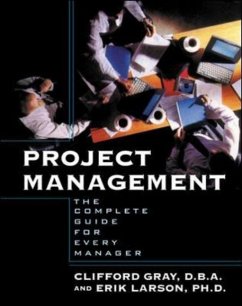Essential reading for passing the Certified Project Manager exam! The First Book to Combine Operational and Human Skills into a Flexible, Proactive Project Management Framework The ability to effectively manage projects is a, if not the, key skill for managers in today's bare-bones, hyperspeed workplace. Still, in most organizations, comprehensive project management training programs remain more the exception than the rule, leaving managers to make up the rulesand pick up the piecesas each project takes on a life of its own. Project Management is today's most thorough training manual and reference for understanding and managing every aspect of the project environment. Focusing on the human element that is critical to project implementation and completion, it provides: An intuitive five-step approach for collecting the necessary information to plan, schedule, and control a project Keys to managing project teams and ensuring effective communication between teams and stakeholders Techniques for maintaining controlboth formal and informalover projects of every size and scope A project is a process, one that either succeeds or fails one small step at a time. As a manager, you and you alone are responsible for the timely and successful completion of each step. Project Management features examples, case studies, and analysis for each phase of the typical project, to ensure that each project you manage meets its goals on time and on budget. Projects involve the creation by an individual or team of an entirely new product or process. To reach that goal, project managers must understand both the operational and human aspects of spearheading a project from conception to completion. In addition, because each project has unique characteristics and requirements that often aren't apparent until the project is well under way, a manager must be fully prepared to provide intuitive and instant solutionsand be confident those solutions are correct. Project Management provides proven guidelines for managing projects from both the operational and behavioral standpoint. This added focus on the human aspectunique in today's project management professional libraryshows you how to work within the existing organizational culture, manage stakeholders and team members based on their differing and often competing goals and viewpoints, and even manage projects across organizations with opposing goals and cultures. Beginning with the initial planning stages and moving through teambuilding, control, and final delivery of project results, Project Management outlines solution-oriented, integrated methodologies for implementing the processes of project management. Examples from a wide variety of both manufacturing and service environments highlight the hands-on skills and solutions required for: Defining projects Organizing projects Estimating time and cost requirements Analyzing and managing project risk Managing teams and stakeholders Scheduling resources for utilization and availability Monitoring performance Conducting and learning from a project audit Effective project managers must seamlessly blend operational skills, prioritization abilities, and behavioral insights, often simultaneously. Project Management outlines a step-by-step framework for managing any project, in any industry or environment, and consistently achieving objectives with a maximum of efficiency and a minimum of waste.
Bitte wählen Sie Ihr Anliegen aus.
Rechnungen
Retourenschein anfordern
Bestellstatus
Storno

